|
Visiting
New Zealand's
wine regions
Part 10: Esk Valley, Hawkes Bay
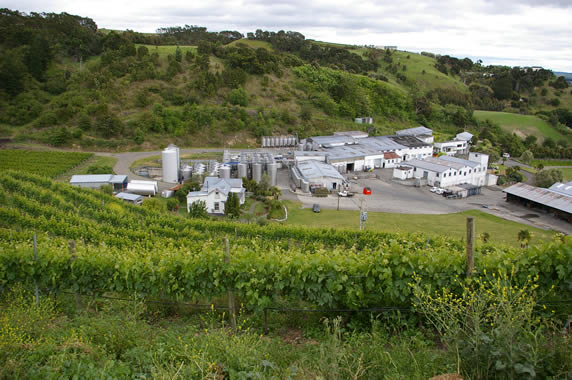
Heading
north out of Hawkes Bay, the main road passes by Esk Valley, and
its famous ‘Terraces’ vineyard. The winery, which is historic
by New Zealand standards, sits nestled in an amphitheatre created
by vines on one two sides and a hill on the other, and from this
site there are views out to the sea. It’s a lovely setting.
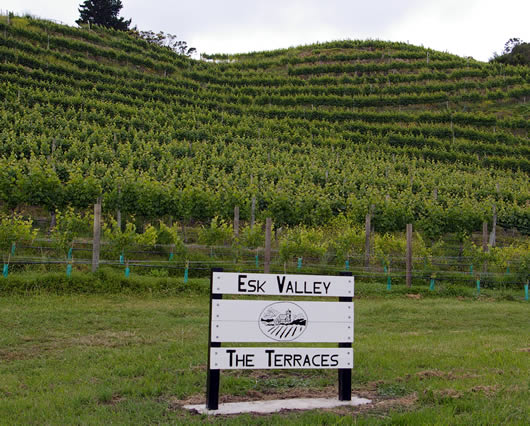
Established
in the 1930s as Glenvale, the speciality here used to be
fortifieds, and the brand Esk Valley was only created in the
1970s. Glenvale went into receivership in the 1980s and was
purchased by George Fistonich, owner of Villa Maria. However, Esk
Valley, as the winery is now called, is an autonomous operation
with its own facilities and winemaking team, headed up since 1993
by Gordon Russell.
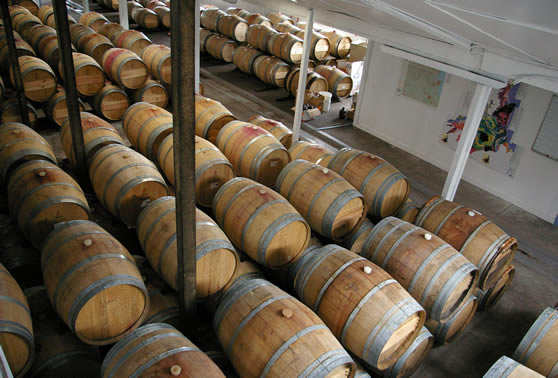
Esk
Valley’s wines are all from Hawkes Bay, and they source from 28
different vineyards spread throughout the region. Total crush is
around 750 tons each vintage. Gordon Russell takes a hands-off,
terroir-driven approach to winemaking, and tries to allow the
different sites to express their characters. In the winery, there
are rows of 70 year old open-top fermenters, which are still used.
They remind me of the lagares that you find in Portugal’s Douro
valley, which fits in with the terraced vineyard theme, I guess.
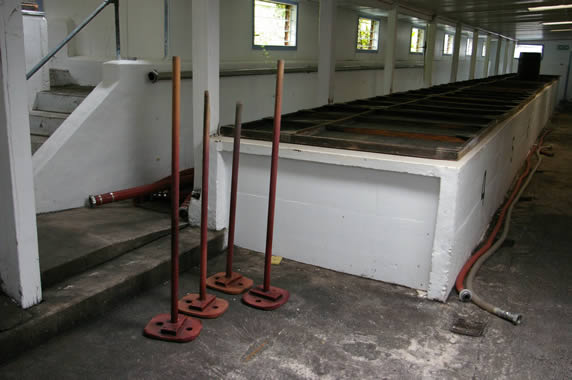
Open
fermenters with some punch-down poles in the foreground
The
wines impressed. The range is quite broad, and includes the
unexpected, such as Verdelho and Chenin Blanc, as well as some
serious reds.
Esk
Valley Chenin Blanc 2006
From two different vineyards, one third goes into old oak, the
rest is kept in stainless steel. Bright, fresh nose with a
distinctive minerality and a hint of smoky, herby complexity. The
palate is lively and fresh with lovely rounded, rather spicy
appley fruitiness as well as a touch of herbiness. Rounded and
quite complex. 91/100
Esk
Valley Verdelho 2006
The only Verdelho in New Zealand, this comes from two
different vineyards. Bright, aromatic and herby with some sweet
honeyed notes and minerality. The palate is broad and rich
textured with nice softness and good acidity. Almost Alsace-like,
with a hint of sweetness. 89/100
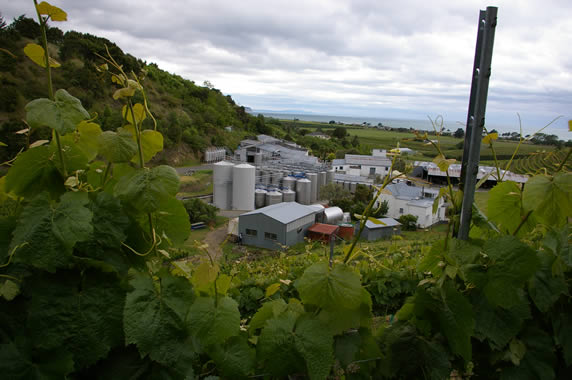
Esk
Valley Pinot Gris 2007
From two different vineyards, one in Kidnapper’s Cove, the
other in Eskdale. The second vineyard is picked at three stages:
early, normal and late (for some botrytis). Very interesting
brightly fruited aromatic nose, which is lively and herby with a
hint of spicy richness. The palate has a full, rounded texture. It
is quite rich, but nicely complex. Grapey and broad with
smoothness and nice spicy balance. 88/100
Esk
Valley Reserve Chardonnay 2005
The goal here is to make this wine in a complex minerally
style, with a mix of vineyard sources. Very full, expressive nose
of fig, toast, butter and herbs. The palate is fruit-led with soft
texture and complexity. Quite classy. 91/100
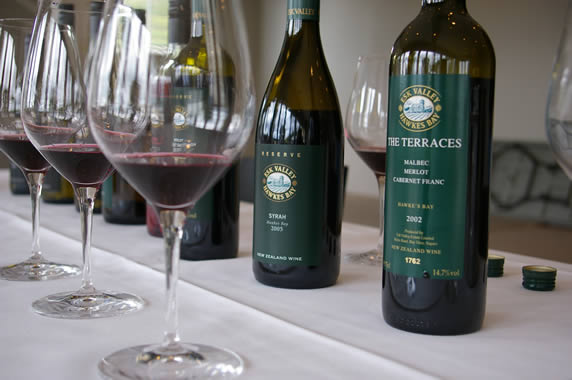
Esk
Valley Rosé 2007
A blend of Merlot and Malbec. The juice is cleaned up and then
undergoes a long, cool fermentation. Very deep pink, this has a
sweet, intense strawberry fruit nose. Really seductive. The palate
is rich and intense with strawberries and cream character, as well
as nice acid freshness. 88/100
Esk
Valley Reserve Merlot Cabernet Sauvignon Malbec 2004
From Gimblett Gravels fruit, given an extended (up to 30 days)
post-ferment maceration in the concrete fermenters, before
spending as long as 24 months in barrel. Sweet, lush dark fruits
nose: smooth, quite pure and very ripe, with just a hint of
gravelliness. The palate is smooth, concentrated and elegant with
sweet fruit over a gravelly, minerally, tannic core. A serious
effort. 92/100
Esk
Valley Reserve Syrah 2005
A single vineyard on the gravels. Smooth, dark, brooding nose
with a bit of white pepper freshness and pure dark fruits. Lovely
fresh dark fruits palate has a grippy, minerally edge to it. A
fresh style finishing quite savoury with good acidity. Wonderful
stuff. 93/100
Esk
Valley ‘The Terraces’ 2002
This is the flagship wine from Esk Valley, made from the block
of terraced vines surrounding the winery. It’s only made in good
vintages (there was no ‘Terraces’ in 1996, 1997, 1999, 2001
and 2003). The grapes are fermented together in concrete, have a
25 day post-ferment maceration, and then go into new oak. Dark,
sweet, expressive nose shows pure fruit together with a refined,
spicy character. Seductive and brooding. The palate is
concentrated and rich. It’s broad with good acidity and grippy
tannins under the multi-layered fruit. Great definition and
potential. 94/100
Back
to top
|

